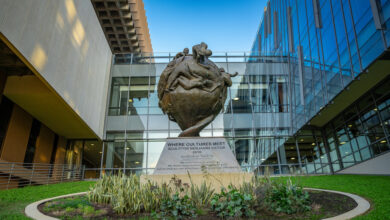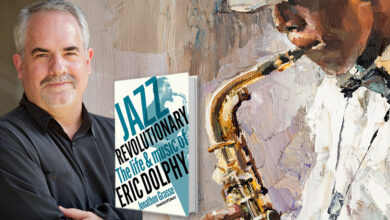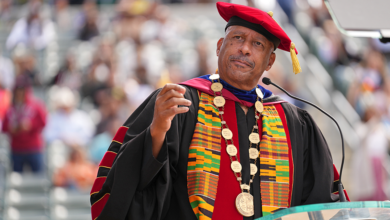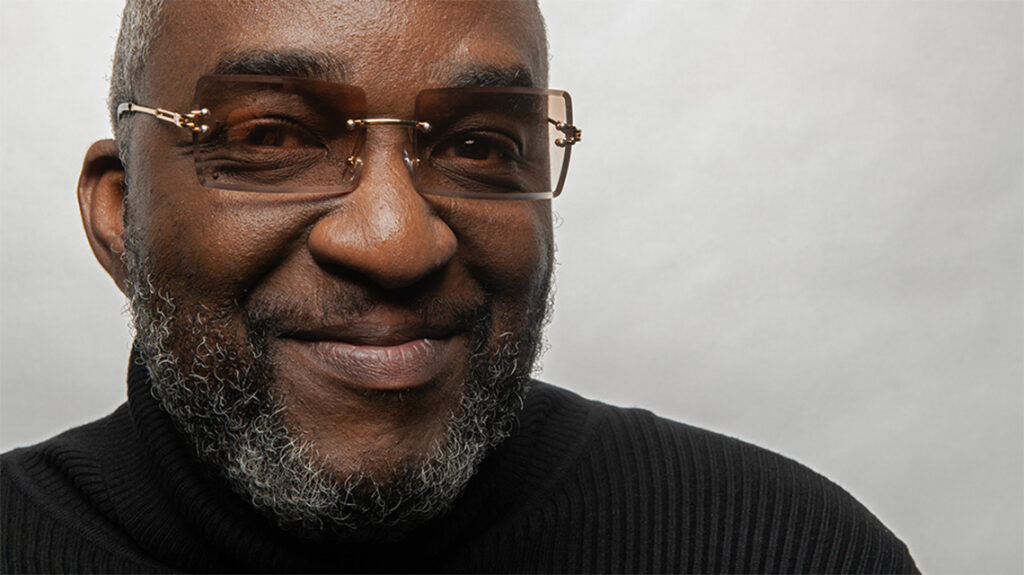
Kevin Jones never expected to graduate from college. In fact, after graduating from high school in 1988, he made the conscious decision not to pursue higher education – even though his three sisters had all gone on to university studies.
“School and I were not friends,” recalls Jones. “All the way through elementary school, then in high school, I just wasn’t the typical kid. I was the nerdy type that wasn’t accepted. So by the time 1988 came around, I had made up my mind. I was done with school.”
Jones went so far as to hold a mock funeral in the backyard of his mother’s house, digging a hole and burying his textbooks in it. He had decided that the blue collar lifestyle suited him best, and spent the next three decades drifting from one job to the next. “Truck driver, security guard, nurse’s aide – I did anything you can think of that’s underpaid and undereducated.”
It wasn’t until 2014, when the Los Angeles native found himself unable to pay rent and ended up homeless on the streets of Atlanta, Georgia, that Jones decided to turn his life around.
“It was March 14, 2014,” he says. “I’ll never forget the date. That’s when I had the revelation that life was getting serious. All of a sudden, the light bulb came on. I asked myself, ‘What are you doing with your life? What happened?’ From then until now, I was on a path to change things. I didn’t know that the path would include about four and a half years of homelessness…”
That path has now led him all the way to the Commencement stage at Dignity Health Sports Park, where he will receive his bachelor’s degree in Africana Studies from CSUDH on Friday, May 19.
“I thought I would be stuck in that lifestyle forever,” he says. “And now I’m considering options for graduate school. It’s amazing.”
Upon losing his home in Atlanta, Jones drifted along, sleeping in his car or abandoned warehouses before adapting himself to living in local homeless shelters.
“I had to learn the system, because every shelter has one,” he says. “For example, you have to be in line for bed every day at the same time. You really have to figure out your life based on that system.” Jones moved from shelters in Atlanta to those in San Jose, Calif., before ending up on Los Angeles’ Skid Row.
It was while on Skid Row that Jones dedicated himself to self-improvement. “I told myself I had two options,” he remembers. “I can stay here at rock bottom or I can go in the opposite direction. I started working on a plan of growing up.”
While staying at the Union Rescue Mission in downtown Los Angeles, Jones enrolled in a program there aimed at helping get clients off the streets. “They have a program for anybody that’s serious about not being homeless,” says Jones. “It’s a one-year program. If you go through the program, by the end of it, they guarantee you an apartment and a job. They don’t just kick you out and say, ‘You’re on your own.’”
He started working at the shelter while still living there. Within a few months of starting the program, Jones was able to move into his own apartment. Again, it’s a date he’ll always remember.
“I moved out of the Union Rescue Mission on June 18th, 2018,” he says. “I jumped in a taxi over to the apartment that they had for me in Compton. I’ve been off the street ever since!”
Jones’ return to school happened almost by accident. He was walking through Lueders Park in Compton while a career fair was going on. As he walked past the Compton College booth, the woman working there asked him if he wanted to enroll in school.
“I looked at her, and strangely, I considered it,” says Jones. “I walked over to the booth and I thought, ‘You ain’t got nothing to lose, right? I signed up, and the next thing you know, it’s Fall 2019 and I’m enrolled in junior college. Then I started seeing some good grades–grades that I wasn’t even getting in elementary school.”
“All of a sudden, my brain turned on and I could do the work. As I kept seeing those A’s and B’s coming in, I thought, ‘I can do this, and I’m going to keep working and see how far I can go.’”
Jones graduated from Compton College in May 2021, and transferred to CSUDH for the Fall 2021 semester. There, the good grades kept coming, and Jones’ abilities were noticed by his professors.
“I was impressed with his excitement for learning,” says Donna Nicol, chair of the Africana Studies department, who became a mentor during his stint on campus. “I could tell that he really appreciated the opportunity to learn about his own history and culture. This type of perspective helped him make sense of the world he had experienced prior to pursuing higher education. He asked a lot of questions and wanted to study everything. In fact, getting him to focus on a single area of study within Africana Studies would be a challenge we faced as he progressed through his classes!”
Jones first encountered Nicol while taking her Black Movements of the Sixties course. “She blew my mind,” he recalls. “She was talking about this stuff I never knew existed. It’s kind of like when Keanu Reeves got unplugged from the Matrix and couldn’t believe what he saw. That’s what was happening to me in her class. She was removing my rose-colored glasses. I thought, ‘Kevin, you’ve been in the clouds all these years. This is what the world really looks like.’
“I was sitting in her class thinking about what I’d done and what I was going to do. After I got past the emotional aspect, then the inspiration to catch up and begin making a difference started to overtake me. I realized I couldn’t continue to kick myself for what I hadn’t been doing.
“As Dr. Nicol says, ‘Find a fight and get in it.’ So these last few semesters, that’s what I’ve been doing!”
Jones says that when he first went back to school, seeing the young faces of his classmates brought out a case of Imposter Syndrome. “It wasn’t about feeling like a fake as far as what I was studying and what I was planning on doing. It was feeling too old for the class.”
“I had an attitude of, ‘You really missed your time, man. Look at these young people. You can’t even be in the class with these guys. You should step aside and let the younger people take it.’ I struggled with that for a while. Then I started fighting through it, with the help of Dr. Nicol and a few other professors.”
They convinced Jones that his feelings were normal, and to learn to accept himself and move forward. “Dr. Nicol gives you that in your face/kick in the pants type of inspiration. If she sees somebody that she feels is serious about the work that they’re doing, she stays on them, to make sure that they get to where they’re supposed to go. Even though I had a burning passion inside, the fear dominated me for a long time. Now, I’m not so concerned about what other people think. I learned to stop derailing my own train.”
“Kevin is an inspiration for the older, returning student,” adds Nicol. “He not only came back to get his degree, but he also availed himself of the programs and services on campus. I nominated him to the Mellon Mays Undergraduate Fellowship Program through the College of Arts and Humanities. This gave him the opportunity to present his research in public and interact with students all over the country. I am delighted to have been Kevin’s instructor and mentor. I expect great things from him!”
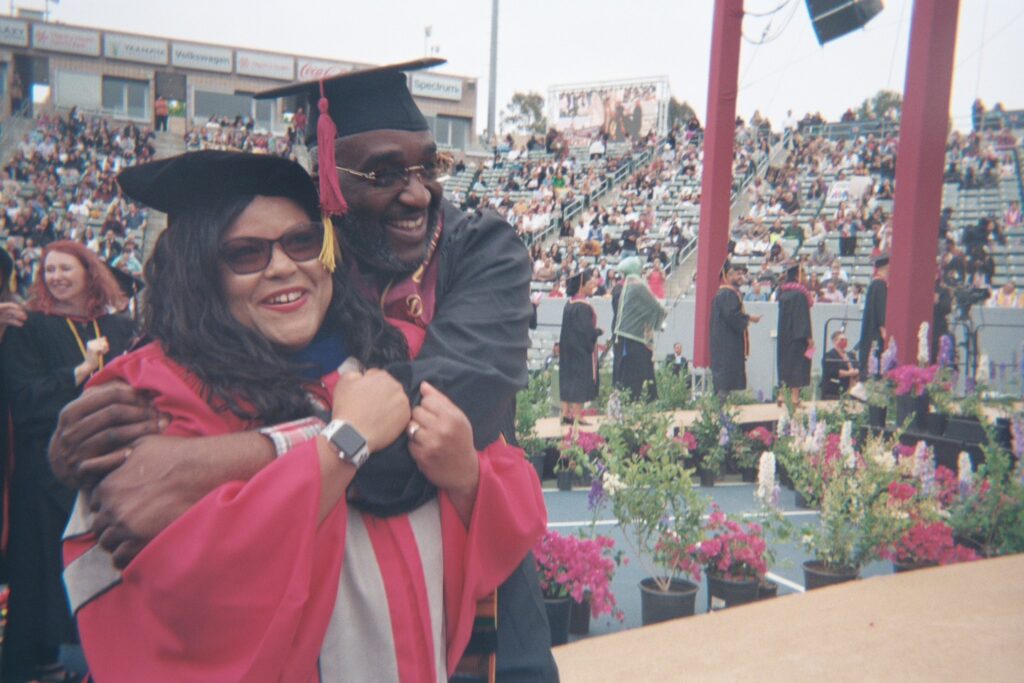
Currently, Jones is weighing his graduate school options, while also building a local catering business. Ultimately, he sees himself in some kind of educational position. “I can see myself overseas, teaching English in Africa. That would be awesome.”
Above all, Jones is determined to make the most of the time he’s been given and the second chance that he earned. “I may have 50 more years to live. What am I going to do with it? There are so many things that society says you’re too old to do. What does that mean for people who are 50 and older? Does that mean you have to spend the next 50 just sitting around moping, or are you going to do something with that next 50?”
“I’m not going to sit around and wait for the nursing home. I’m going to do something with the rest of my time.”
Jones’ advice to his fellow Toros stems from his own experiences. “Don’t fear the process at all,” he says. “Every human being has a particular process. One person’s process might be homelessness, or it might be success straight out of high school. One person might have everything made out for them at the beginning, while another person might have a whole lifetime full of struggle, and then see some success later on. Whatever your process is, go through it, learn life lessons from it, and build from there.”
He also cautions against second-guessing yourself or letting negative emotions cloud your focus. “Whether you’re young or old, you will discover in life that you can be your own worst enemy. You might be afraid to speak up or take that next step in your life. Don’t let that happen!”

